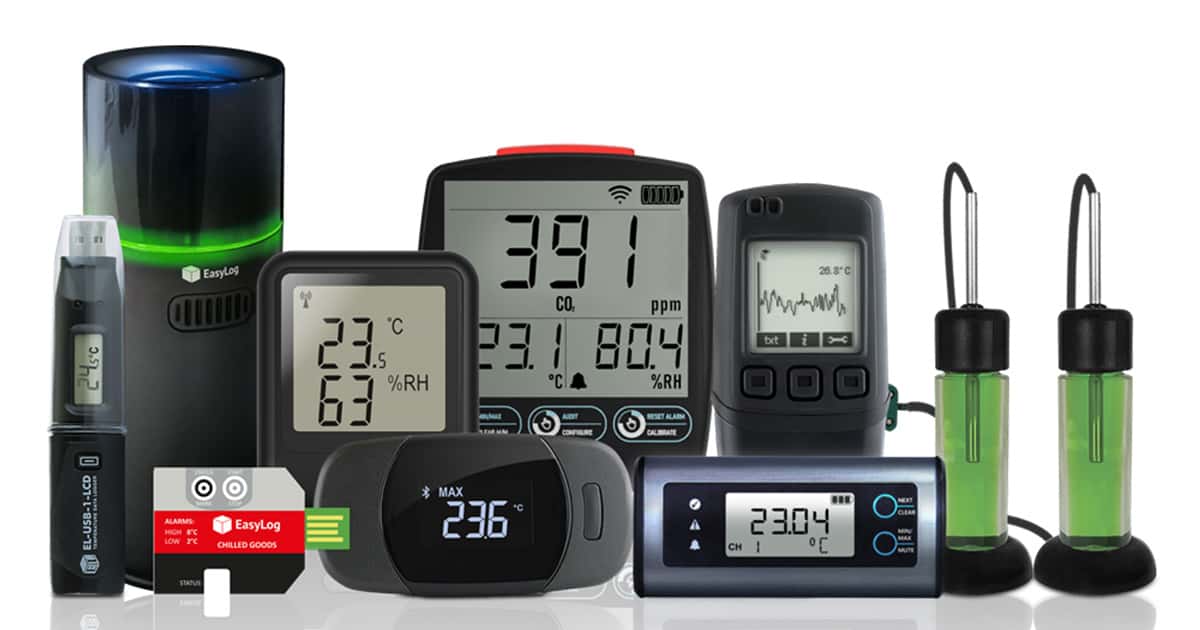Choosing the correct data logger is critical in today’s data-driven society for precise and dependable data collecting.
Selecting the right data logger for you is critical whether you are monitoring environmental conditions, tracking energy usage, maintaining the safety of perishable commodities, or carrying out scientific research.
This comprehensive buying guide will give you useful insights and information to help you make informed choices.
We’ll discuss the numerous types of data loggers on the market, including data recorders for temperature, humidity, pressure, and air quality, as well as an explanation as to how and why they are used in a variety of applications. In addition, we will go through the benefits of data loggers, key features to look for, and explain how they comply with industry standards.
What is a data logger?
A data logger is a device that captures and retains data over time, making it an important tool in scientific research, industrial processes, transportation, and environmental monitoring.
Continuous data gathering and analysis are crucial in many sectors for optimizing operations and making informed decisions.
Temperature, humidity, pressure, CO2, and voltage are just a few of the factors that these devices can monitor. Some data recorders are self-contained, while others are linked to a network or computers for real-time monitoring and analysis.
Because data loggers come in a variety of sizes, forms, and levels of complexity, selecting the right one takes careful consideration.
Advantages of data loggers
A data logger’s capacity to deliver ongoing, precise data collection over time is one of their main advantages.
Data loggers ensure that no important information is overlooked by automatically measuring and recording data at regular intervals, giving a thorough understanding of the system or process being monitored.
Additionally, data loggers do away with the necessity for manual data entry, lowering the possibility of human error and freeing up time for other duties.
Their data storage capacities allow for in-depth analysis and trend detection, permitting users to find insightful information and make wise judgments based on extensive data sets.
They can collect precise data continuously over time, which is one of their main advantages.
How to choose the right data logger
Choosing the best data logger involves careful evaluation of several aspects. To begin, the device’s data storage capacity should be addressed, especially if the application requires long-term monitoring.
It is critical to select a data logger with sufficient memory to retain all essential data without the need for frequent data downloads.
Users who wish to view their data remotely or share it with other team members can also use cloud storage.
When selecting a data logger, users should carefully consider the specific parameters they need to measure, ensuring their chosen device meets their data collection requirements accurately.
Another crucial component is real-time monitoring, and users should select data loggers that have this capability, especially in applications that need an immediate response.
Different businesses have different data logging requirements, therefore while selecting a data logger, users should also examine the applicable legislation and recommendations.
Finally, consider the device’s longevity, battery life, and operating circumstances, especially if the application needs operation in a harsh environment.
Users may pick a data logger that matches their demands and offers accurate, dependable data for their application by taking these considerations into account.
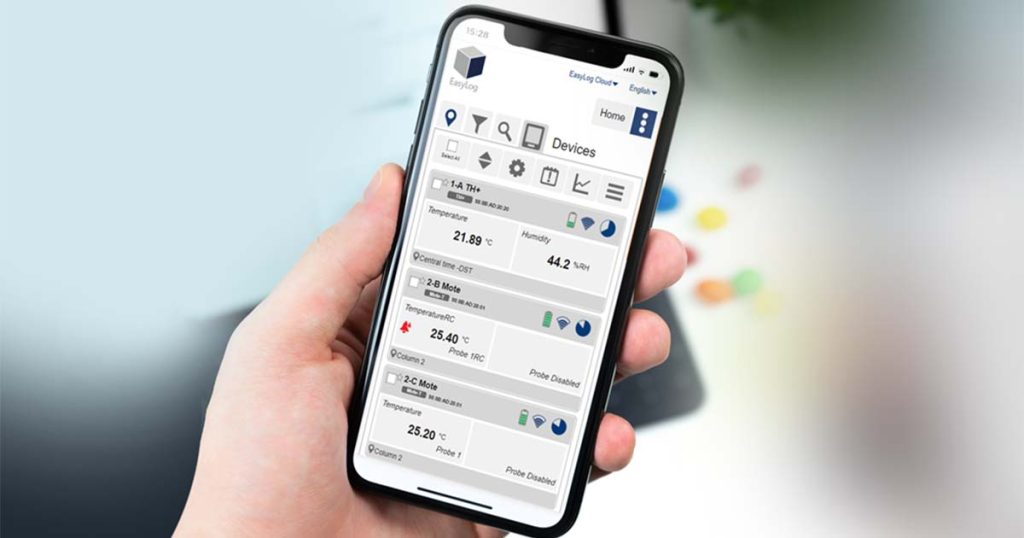
Common applications
Data loggers are used in a wide range of sectors and fields because of the extensive and diverse uses for data logging some of these include:
- Environmental monitoring
- Industrial process control
- Research and development
- Medical
- Cold chain monitoring
- Automotive emissions testing
- HVAC system monitoring
- Occupational health and safety monitoring
- Power monitoring
- Food safety monitoring
- Pharmaceutical storage and transport monitoring
- Greenhouse monitoring
- Museum and artifact preservation
- Energy management and optimization
- Transportation and logistics (temperature-sensitive goods)
- Water quality monitoring
Environmental monitoring is a popular application, with data loggers used to monitor temperature, humidity, and air quality in places like greenhouses or buildings.
These instruments are used in industrial process control to monitor equipment temperature, vibrations, and production rates to optimize operations.
Data loggers help in scientific experiments and field studies in research and development. Data loggers are used in the medical industry to ensure the correct storage and transportation of medicinal supplies.
For perishable commodities, cold chain monitoring is critical to ensure proper temperature throughout transportation.
Other applications include automotive emissions testing, HVAC system monitoring, and occupational health and safety monitoring.
Power monitoring using voltage and current data loggers aids in energy management, while food safety and pharmaceutical storage and transport monitoring ensures regulatory compliance.
Data loggers also help with museum artifact preservation, water quality monitoring, and temperature-sensitive product transportation, making them useful in a variety of industries.
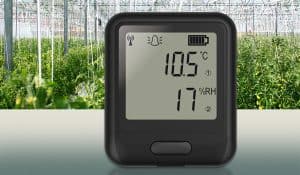
Types of data loggers
There are various types of data loggers, each designed to monitor and record specific parameters. Temperature data recorders are often used in applications such as food storage, HVAC systems, and environmental monitoring to measure and record temperature changes over time.
Humidity data loggers, on the other hand, measure, and log relative humidity levels, which are crucial for controlling moisture in situations such as museums, greenhouses, and industrial settings.
Pressure data loggers are used to collect and record pressure changes in industries such as oil and gas, manufacturing, and aerospace.
Voltage and current data recorders specialize in monitoring and logging electrical parameters, allowing for accurate energy consumption tracking, optimizing power utilization, and assuring equipment safety.
Furthermore, air quality data recorders analyze and record the quality of indoor and outdoor air, which is critical for maintaining healthy surroundings.
Each data logger type serves a distinct role and enables businesses and sectors to collect precise and valuable data for analysis and decision-making.
Temperature
One of the most popular types of data loggers is the temperature data recorder.
When selecting a temperature data logger, users should take their application’s temperature range into account to make sure the device can precisely measure and record the necessary temperature range.
Some temperature data recorders have alarm functions that alert users if the temperature deviates from a predetermined range, making them perfect for applications that need quick action.
Temperature and Humidity
Another form of data logger is the temperature and humidity data loggers.
Temperature and humidity data recorders can assist in ensuring that temperature and humidity levels remain within the intended range, preventing damage to goods or artifacts and maintaining a comfortable working environment.
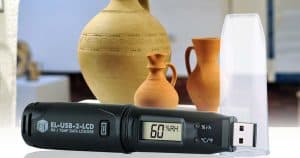
Pressure
Pressure data loggers are used to measure and record pressure changes over time. These devices are used to monitor system performance, locate leaks, and optimize operations in industrial applications including oil and gas, manufacturing, and aerospace.
Pressure data recorders are used to measure both positive and negative pressures and can be configured to monitor specific pressure ranges based on the application requirements. Pressure data loggers are equipped with high-precision sensors that ensure accurate measurements and reliable data logging.
Whether it’s monitoring fluid pressure in pipelines, atmospheric pressure in weather stations, or industrial process pressures, pressure data loggers serve as essential tools for accurate pressure measurement and monitoring.
Voltage/Current
Voltage and current data loggers are frequently used in power monitoring applications to monitor the energy consumption of various electrical systems and equipment.
Voltage and current data loggers can assist in identifying inefficiencies in energy consumption and potential cost-saving options.
Some voltage and current data recorders include alarm functions that alert users if the voltage or current falls outside of a predefined range, making them perfect for situations where fast action is required to prevent damage to equipment.
Voltage and current data loggers are versatile devices that allow for the monitoring and recording of parameters offered by a wide range of industrial sensors, including those that output voltage levels or current levels within the standard 4-20mA range.
Air Quality
Air Quality recorders are specialized devices that measure and record a variety of characteristics to assess the quality of indoor and outdoor air.
Temperature, humidity, carbon dioxide, carbon monoxide, particle matter, and volatile organic compounds are all factors that air quality data loggers may measure.
Air quality data recorders provide significant insights into potential health dangers and environmental situations by continuously monitoring and logging these factors.
These devices help identify pollution sources, the performance of ventilation systems, and the observance of air quality requirements.
Air quality data loggers, with their extensive data collection capabilities, play an important role in fostering healthier surroundings and facilitating effective air quality management.
Furthermore, some air quality data loggers include alarm capabilities that inform users if the air quality falls outside of a predefined range, making them perfect for applications where rapid action is required to prevent contamination.
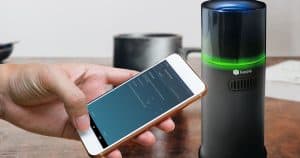
Carbon Monoxide
Data loggers for carbon monoxide (CO) are specifically intended to measure and record the quantities of this colorless and odorless gas in the air over time.
These loggers are essential for applications including interior air quality monitoring, vehicle emissions testing, and occupational health and safety.
Carbon monoxide is a poisonous gas that, in high concentrations, can be hazardous to one’s health. Carbon monoxide data loggers properly monitor and document CO levels in parts per million (ppm), assuring indoor and outdoor safety.
Carbon monoxide data loggers are invaluable instruments for identifying probable sources of CO emissions, monitoring ventilation systems, and ensuring safety rules are followed.
These loggers contribute to the preservation of human health and safety in a variety of contexts by continually monitoring and logging carbon monoxide levels.
Cold Chain Monitoring
Cold chain monitoring data loggers monitor and record the temperature of perishable commodities during storage and delivery, such as food, pharmaceuticals, and biological products.
The proper temperature range must be maintained throughout the cold chain to ensure the quality and safety of these products.
Temperature sensors in cold chain monitoring data loggers accurately measure and record temperature data at regular intervals.
These loggers can also send real-time notifications if the temperature falls outside of the specified range, allowing users to take timely action to prevent product damage.
When choosing a cold chain monitoring data logger, users should examine their application’s specific requirements, such as temperature range and data storage capacity.
Furthermore, certain cold chain monitoring data loggers include cloud-based storage and software, which enables remote monitoring and data processing.
Overall, cold chain monitoring data loggers serve an important role in assuring the safety and quality of perishable commodities, as well as reducing spoilage and waste.
Vaccine Monitoring
Vaccine monitoring data loggers are intended to monitor and record vaccine temperature during storage and transit to ensure that it remains within the appropriate temperature range.
Vaccines are temperature sensitive, and exposure to temperatures outside the prescribed range might render them ineffective, jeopardizing immunization safety and efficacy.
Temperature sensors on vaccine monitoring data loggers accurately measure and record temperature data at regular intervals.
These temperature recorders can also send real-time alarms if the temperature falls beyond the defined range, allowing users to take timely action to prevent vaccine harm.
When choosing a vaccination monitoring data logger, users should examine their application’s specific requirements, such as temperature range and data storage capacity.
Furthermore, certain vaccine monitoring data loggers include cloud-based storage and software, enabling remote monitoring and data processing.
Overall, vaccine monitoring data loggers serve a significant role in maintaining vaccination safety and efficacy, as well as preventing vaccine deterioration and waste.
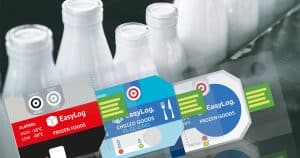
Conclusion
In conclusion, data loggers are valuable instruments that are essential in a variety of fields and applications. They make it possible to continuously monitor and record crucial characteristics like temperature, humidity, pressure, and more.
Data loggers give accurate and trustworthy information that helps to streamline operations, enhance processes, and guarantee that safety and quality standards are met.
Data loggers provide vital insights and information for well-informed decision-making, whether it be for environmental monitoring, energy tracking, protecting the integrity of vaccines or perishable items, or performing scientific research.
Lascar is a reputable supplier of dependable and innovative data logging systems.
Our extensive data logger line caters to a variety of businesses and needs, with features such as cloud storage, real-time monitoring, and compliance with industry standards. With Lascar’s knowledge and high-quality products, you can discover the ideal data logger for your needs.
Don’t pass up the chance to improve your data-collecting and analysis operations.

